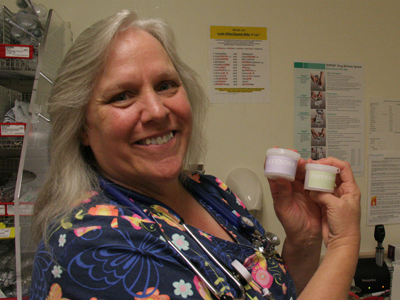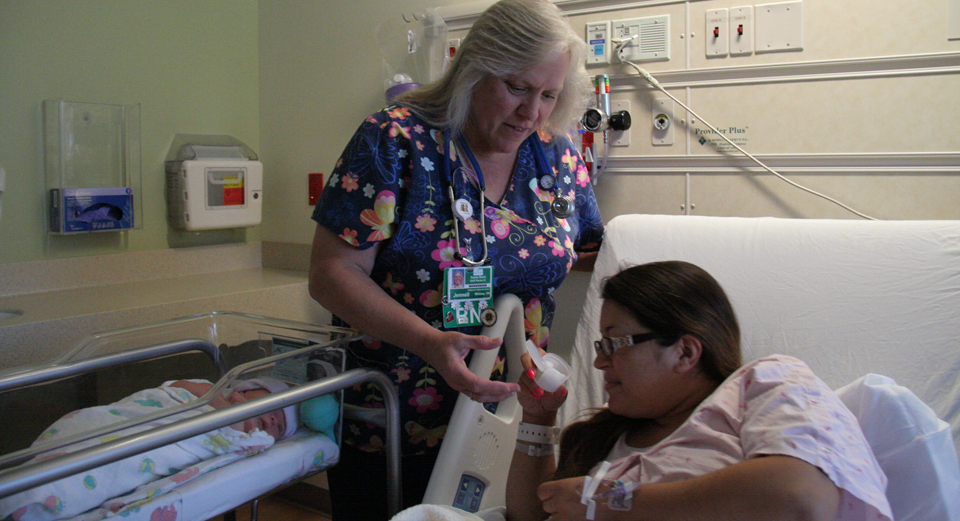Kaiser Permanente Santa Rosa nurses researched aromatherapy, ultimately bringing lavender and peppermint oils as a comfort to new moms.
After giving birth to baby Ja’ir at Kaiser Permanente Santa Rosa on Oct. 9, Maria DeAnda was feeling queasy.
But help was on the way—in the form of peppermint—compliments of her nurses.
The remedy comes in a small container full of three scented cotton balls for inhalation only, and is a new service provided to moms (and dads!) post-labor. Members may choose from the essential oils of peppermint, proven to reduce nausea after surgery, or lavender, shown to relieve anxiety, stress, and pain.
For DeAnda, a Rohnert Park insurance agent, the relief was immediate.
“I was surprised when it was offered. But I was so nauseous I couldn’t even hold down any water. And it helped right away.”

The women behind the new aromatherapy service are Jennell Whitney, RN; Diane Schwab, RN, now retired; and Donna Lamke, RN.
The three had discussed the merits of aromatherapy in their own lives—with Whitney, a veteran 36-year nurse, using it for her own relaxation and pain relief—before deciding to try to bring essential oils as a high-quality service to new mothers.
“I’ve learned that we need to treat the whole person, and aromatherapy is in line with that,” Whitney explained.
As with anything new brought to patients, the aromatherapy offering went through a rigorous review process before being approved.
In the summer of 2013, Whitney began the research to prove the efficacy of aromatherapy, which was supported by a program currently at the Mayo Clinic. From there, Schwab wrote a one-page policy, which was then reviewed and approved by the Kaiser Permanente Santa Rosa Maternal Child Health Group, Policy & Procedure Committee, and Medical Executive Committee.
The trio of nurses, supported by Lisa Hazleton, manager of Maternal Child Health Services, discovered few obstacles along the way.
They did learn that the two scents—chosen for the strong evidence of their efficacy—must be inhaled rather than used topically in order to not require a physician’s order, and that they must be enclosed in their airtight containers so the fragrances would not bother anyone with allergies. The oils are for adult, non-pregnant patients only.
There is some precedent for alternative means of comfort already at Kaiser Permanente Santa Rosa: Patients receive envelopes with small packs of gum after Cesarean Section surgery. Chewing gum has been shown to stimulate normal gastrointestinal function and decrease gas pain following abdominal surgery.
On the heels of the popular gum offering, the aromatherapy was embraced by members when it launched last May.
“I would say that easily 75 percent of new moms use the aromatherapy,” said Hazleton. “It is in line with the Caring Science nursing approach of treating the mind, body, and spirit of our patients.”
The cotton balls and drops of peppermint and lavender are ordered from a medical supply company, then assembled by the nurses, who put a few drops of the essential oils on the cotton balls, seal them in the containers, and label before offering to patients.
When a patient accepts a container, her information is printed on its other side. She receives an accompanying index card that explains the essential oil, its benefit, and how to use it, including a reminder that it can be used with any of her medications. The member can use the essential oil as much as she likes during her stay, simply re-capping the container when not in use.
The container goes home with the member, and is effective for six months.
“It is wonderful that RNs can offer alternative therapies, such as aromatherapy, to our members,” said Gretchen J. Summer, PhD, research scientists and director of Kaiser Permanente Northern California Nursing Research. “In fact, the enthusiastic support for the use of aromatherapy has inspired the Kaiser Permanente Northern California Nursing Research to partner with a physician to evaluate the effects of essential oils on nausea in a multi-facility research study. We hope to begin work on this exciting project early next year.”





This Post Has 13 Comments
Gratified to see the nurses at KP Santa Rosa not only utilizing evidence-based research, but taking on the challenge of bringing a centuries-old therapy into a modern medical setting. As a proponent of holistic nursing, I applaud Jennell, Diane, and Donna for their hard work bringing this about, and for their years of devotion to evidence-based nursing care. Brava, ladies!
If it is a true therapeutic essential oil and not adulterated in any way it is NOT “artificial.” Most people who have sensitivities to perfumes and fragrances do not have these same sensitivities with a pure essential oil.
As someone that has used essential oils for years I’m thrilled to see it being used at Kaiser. I see no reason why essential oils can’t be used on all patients in same way as they are used on new moms. Also lavender oil is a must in the kitchen for burns. It takes the sting out of burns and helps with healing.
I use essential oils and am an ER RN at Kaiser Roseville. How do I go about trying to get this happening in my facility?
Hi, Teri. You can write directly to Jennell Whitney at jennell.whitney@kp.org.
So happy to see the use of complementary medicine! Great work, Kaiser Santa Rosa, for making this happen!
I have been using essential oils for over a year now. I first started using them to help me with some sleeping problems. I use Doterra products, which are 100% essential oils, thus many are safe to ingest and the preferred method. I use them on myself and my children and swear by their benefits. They have an essential oil for almost every medical problem out there. A class to provide patients with the benefits and information on essential oils would be a great thing to start up for those looking for alternatives to medication.
Yippee! Kaiser nurses actively involved in research. This is a wonderful idea and I hope that this might inspire others to take their great ideas and build them into a research or quality improvement project
I love that KP is doing this. Thank you!
What a great idea, using natural things to help patients feel better instead of more medication…I love it!!!
It is heartening to see nurses taking steps to promote natural health for our members.
As long as the scents do not affect people with asthma and those like me who have strong reactions to most artificial smells including “essential oils”…
Hi, Juana.
Kaiser Permanente Santa Rosa took great care in making sure that the scents are contained, only used by the patient who wanted the container, and that as soon as it is inhaled, the air-tight container is closed again.